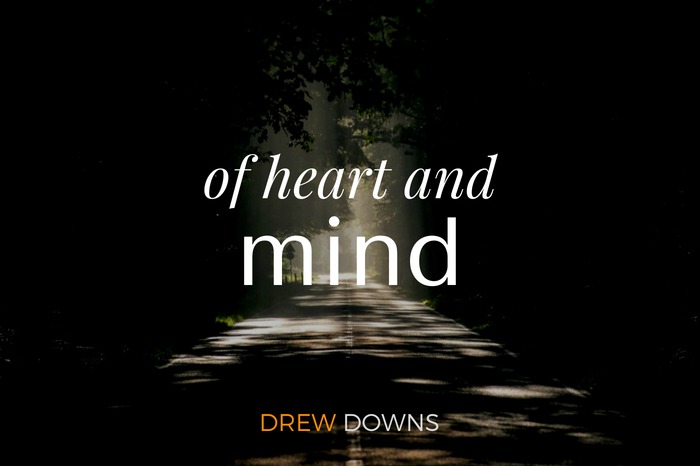In Heart and Mind, Alexander Shaia gives us a useful path for spiritual growth, offering the gospels as an example and guide.
In interviews, Alexander Shaia’s wisdom and profound belief are striking. Hearing him speak to his own story of life and death, invigorates his study. And his interview with Rob Bell about the mythic power of Christmas made it into my own Christmas and Feast of St. Stephen’s sermons.
So I was eager to read his book Heart and Mind: The Four-Gospel Journey for Radical Transformation.
This long and deep dive into experiencing the gospels offers an unusual vibe for the postmodern reader, so eager to uncover and critique as they go. I found my own inner critic halting at some of his declarations and decisions — I needed to remind myself that scholars actually need to choose and make a case for things.
However, the book isn’t supposed to be read that way. And it took me time (and regular reminders) to realize that.
Heart and Mind introduces a way of experiencing the gospels which doesn’t focus on interpreting the text but interpreting ourselves with the text as a spiritual guide.
Realizing that the point Shaia is trying to make couldn’t be found by critiquing his writing or interpretation was remarkably freeing. He wants me to focus on what I’m going through!
I suddenly could devour the book with ease and anticipation.
As a writer, Shaia is starting from a challenging proposition because he’s pushing the reader to go against their natural tendencies. We’re used to reading for what the author is saying to us. But he wants us to read for how the stories of the four canonical gospels can speak to us wherever we are at right now.
This point isn’t easy to make
When describing to people what I was reading, I found the words hard to share. What is this book about, really?
And worse, the accurate, 90-second rundown of the book either made people’s eyes glaze over or attempt to argue with the author through me.
I couldn’t quite explain why this book, which is fundamentally about helping guide people through spiritual transformation toward Christian discipleship using the gospels would be useful to them. And I struggled to understand why it would cause such adversarial or befuddled responses.
But I suspect there are two reasons why.
1) My description of Shaia’s purpose was technical, not helpful
I tried to explain what Heart and Mind is by describing his theses the way Shaia does—which I remembered took me a long time to get passed.
In other words, I wasn’t getting to the heart of what was good about it: the active, self-reflected reading of the gospel stories.
Instead, I was sharing his thesis and where he comes from. I wasn’t sharing the heart of his work!
2) Shaia is too focused on creating and defending a project
The central thesis of the book is that the four canonical gospels in the Bible offer us a traditional and demonstrably useful means of spiritual growth. He matches the four gospels to stages of spiritual growth and shares extensively how each gospel matches a stage. He calls this spiritual path “Quadratos”.
The book sings when Shaia dives into these paths and their gospel parallels. He shares the historical connections we have with the first-century readers and shows the many ways Christians have long seen the gospels as a source for interpreting their lives.
But rather than present this core idea as open-ended, inviting us to marvel or speculate, Shaia defends it. And more significantly, he focuses on making these connections more concrete.
Shaia specifically seeks to prove how the Quadratos process has roots in those 1st-century proto-Christians, taking great pains to convince the reader that the modern lectionary comes from a more intentional practice.
This need to argue it’s timelessness as an approach was tinny in my ear and distracting. And it made those I shared the fruits of the book with a bit skeptical. This reminds me of something Phyllis Tickle wrote some years ago: those claiming something is traditional are usually referring to something from this century.
Quadratos doesn’t need to be Self-Help
Shaia’s actual paradigm, the heart of the book, Heart and Mind, rather than the program he’s created around it, is the real value to me.
He uses this Quadratos formula to speak to seasons of faith.
- How we seek wisdom up a mountain,
- wrestle with the light and darkness,
- find God’s presence in the garden,
- and ultimately follow the call to discipleship.
This all rings incredibly true.
This interplay between personal growth and reading the gospels could be a huge help in Christian formation. And thematizing the lectionary would be a natural response.
This beautiful, imperfect work will be one I return to and use in my ministry; most likely in aiding in spiritual diagnosis and development: particularly in offering a gospel they could meditate with. I’m also planning to use it in designing a new confirmation curriculum with Quadratos in mind from the beginning.
I highly recommend Heart and Mind to some people. Particularly those who love to read, can suspend their inner critic, or are seeking spiritual guidance. Pastors or educators building a new curriculum may also find this to be a useful and complementary resource. But if your heart or mind are full right now, you’d probably rather put it on your “Maybe Someday” list.

